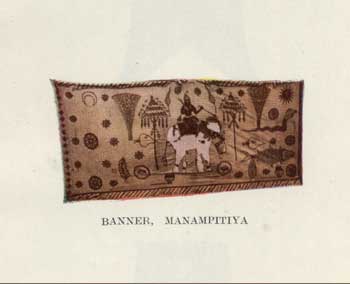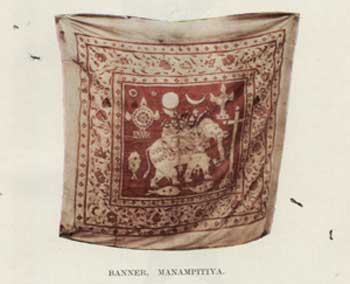Romance Revisited . . . it wasn’t his bride he found.
This story of romance is about a clan of Hindu Karavas, off the coast of Chilaw, that claim descent from the Kurukulather Chiefs of the Varnakulasuriya Clan.
The Sunday Observer, 3rd October, 1960
In the Tamil month of Avani, which corresponds with the latter half of July and the first part of August in the English calendar, is an eighteen day festival which commences with the Divajarohanam (flag hoisting) and ending with fire walking in front of the Draupadi Amman Temple, in the village of Udappu.
The intervening period is spent in prayer and fasting, with a priest reading out of the Pataranga Jataka – to remind the people of the history of Draupadi, the virgin wife of the five Pandava Princess, whose chaste and virtuous ways enabled her to recover the kingdom her husband had been deprived of by King Turiyodanam.
Situated as it is at the Southern extremity of the Mundel Lake, and being sixty five miles and two hours motoring distance from Colombo, the numbers who view this ceremony every year are increasing, especially the foreign visitors, who return surprised at having seen so many people walk over the red hot cinders with bare feet.
Different
The people of the village are Hindu Karawa, with a cultural life that is altogether different from the rest of the people living along the coast in the Chilaw District and engaged in deep-sea fishing. They take pride in claiming descent from Kurukulather Chiefs of the Varnakulasuriya clan, who came over from India with their Makara flag and pearl umbrella, under circumstances caused by an unfortunate romance.
Their King had a beautiful daughter, named Kamalakanni, who was sought after as a bride by the King of the Maravars. But this her father would not agree to in view of the wild ways of the suitors people which have given the Sinhala language the word ‘Maravaraya’, meaning a desperado.
Fear of the persistent and powerful lover Kamalakanni’s father finally agreed to the marriage and he even built the nuptial halls and pandals as was customary at that time.
But he fled with all his people and their belongings the night before the wedding and the arrival of the would be bridegroom.
The angry man was made more angry when he found that instead of a bride waiting for him there was a bitch left tied to the Arasanikal (Bridal Post) and swore to avenge the humiliation and loss of honour he thus suffered.
The Karawe party landed at Mannar but came Down South to Kalpitiya and from there to Puttalam, finally traveling through Mundel to settle down at Udappu, some of them later shifted to villages nearby, such as Munneswaram, Gojjaragama and Mandanmunai.
Drowned
Hearing that the disappointed suitor was determined to claim his bride her people drowned her, with her consent, so doing away with the prize he intended coming for. The unfortunate lady was deified as the Kula Devata or protector of her people and is remembered annually with an almsgiving where she is represented by means of a pot of water.
History was repeated with a difference, when at a later date the Karawe Chief Manika Talaivar sought the hand of the daughter of the Mukkuvar Chief, Veddi Arasan and was refused.
This led to fighting between the two peoples concluding with the defeat of the Karawe forces after a fierce battle fought on the plain between Mangalaveli and Kattakaddu.
This is said to be one of the reasons for the communal flag and insignia being removed to Mannampitiya near Pollonnaruwa, where the descendants of those who went there with their Kuddimakal (personal attendants), such as the washerman and barber, are still to be met and the flags still in evidence.
One flag has a white elephant as the centre motif and the other has an elephant with the sun and the moon above and three fish below.


Leaders
People of this village have always been in the forefront of affairs in the Chilaw District and served on the panel of trustees of the Munneswaram Temple, which is probably the reason for the fish being prominently carved on the roof of the beautiful stone Mandapam above the main shrine.
The victory by the Mukkuvars enabled them to establish themselves in the Puttlam District and to obtain grants of land and office from King Tanavila Bahu of Madampe and Kin g Buvenake Bahu of Kotte.
A record available is the Sannasa (deed of gift) in which a Mukkuvar Chief named Navaratne was gifted all the land between Kudremalai and Puttalam by King Tanavila Bahu.
A council known as the Muramaddu and composed of eighteen Mukkuvar Chiefs with a Dissawe presiding was appointed to manage the affairs of the people and the area.
Shrewed
The more sedate and business minded Muslims have bought up the lands of the Mukkuvars and slowly but steadily gained control of the area since then.
Mundai Lake which extends from Udappu up to Puttalam, provides pleasant scenery along the stretch of road between Chilaw and Puttalam, with coconut and palmyrah, palms, towering above scrub jungle through which cattle and ponies are followed by asses.
Fishermen wading in it sink almost up to their knees to come out coated with a blue mud that is rarely seen elsewhere and earned the Dutch soldiers the nickname of Blue-Boots when they marched through.
Henry Corea